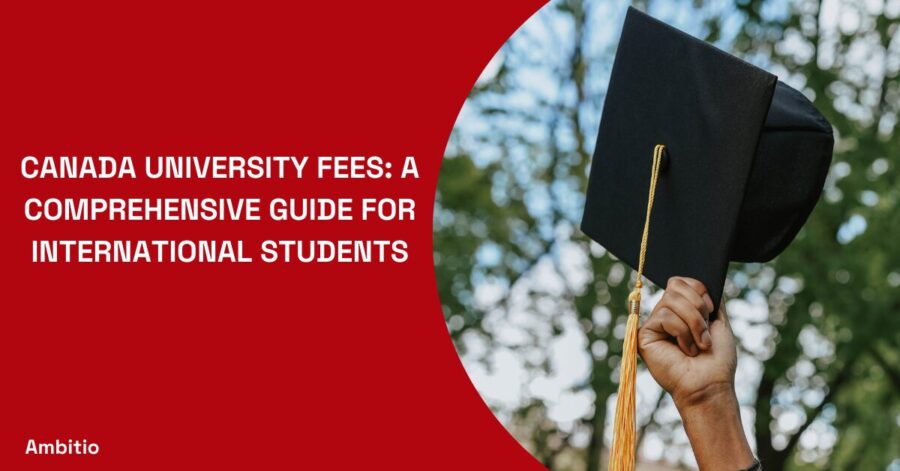13 December 2024
5 minutes read
Understanding Canada University Fees: A Comprehensive Guide for International Students

Canada is renowned for its high-quality education system and diverse cultural landscape, making it a prime destination for international students. Understanding the financial aspects, particularly the university fees in Canada is crucial for those planning to study in the country.
This comprehensive guide aims to provide detailed insights into the costs associated with studying in Canada, including tuition fees, living expenses, and additional costs.
Breaking Down Tuition Fees for International Students in Canada
Tuition fees for international students in Canada vary widely depending on the university and the program of study. On average, international undergraduate students can expect to pay between CAD 20,000 to CAD 30,000 per year. However, for more specialized programs like medicine, engineering, or MBA, the fees can be significantly higher.
Factors Influencing Tuition Costs in Canadian Universities
Several factors influence the tuition fees at Canadian universities. The reputation and location of the university play a crucial role. For instance, prestigious institutions like the University of Toronto and the University of British Columbia may charge higher fees.
Additionally, programs with more resources and laboratory work, such as sciences and engineering, often come with higher tuition costs compared to arts and humanities programs.
Tuition Fee Variations Across Different Universities
The variation in tuition fees is also notable across different Canadian universities. Public universities generally have lower tuition fees compared to private institutions.
For instance, the tuition fees at the University of Saskatchewan might be more affordable than those at McGill University. International students should thoroughly research and compare the fees across different universities to make an informed decision.
Understanding the Living Costs for International Students in Canada
Living costs in Canada, which include accommodation, food, transportation, and personal expenses, are an essential aspect of financial planning for international students.
Accommodation Costs in Canada
Accommodation is one of the significant components of living costs. The options range from on-campus residence halls, which can be relatively expensive, to off-campus housing such as apartments and shared rentals, which might offer more affordable alternatives. The average cost of accommodation can vary from CAD 500 to CAD 1,200 per month, depending on the city and type of housing.
Other Essential Living Expenses
Other living expenses include food, transportation, and personal spending. While these can vary based on personal lifestyle, an average monthly budget for these expenses would be around CAD 600 to CAD 800. Cities like Vancouver and Toronto are on the higher end of the cost spectrum, whereas smaller cities and towns offer more budget-friendly options.
Scholarships and Financial Aid for International Students in Canada
One of the most significant concerns for international students wishing to study in Canada is managing the cost of education and living expenses. Fortunately, Canadian universities, the government, and various private and public entities offer a range of scholarships and financial aid. These financial supports aim to make education accessible and affordable for students from around the world.
Understanding the Types of Financial Aid Available
In Canada, international students can avail themselves of various types of financial assistance. These include:
- Merit-Based Scholarships: These are awarded based on the student’s academic achievements, extracurricular activities, and sometimes, leadership skills. Universities often automatically consider applicants for these scholarships upon admission.
- Need-Based Grants: These are designed for students who require financial assistance to cover their educational costs. Applicants need to demonstrate their financial need.
- Program-Specific Scholarships: Some scholarships are specifically for students enrolling in particular fields of study, like engineering, business, or the arts.
- Country-Specific Scholarships: Certain scholarships target students from specific countries or regions, aiming to promote cultural diversity on campus.
Key Scholarships and Grants for International Students
Several renowned scholarships are available for international students in Canada, including:
- Vanier Canada Graduate Scholarships: Aimed at doctoral students, these prestigious scholarships are awarded for leadership skills and high academic achievement in social sciences, humanities, engineering, or natural sciences.
- Canadian Commonwealth Scholarship Program: Funded by the Canadian government, this program offers scholarships to students from Commonwealth countries pursuing postgraduate studies in Canada.
- University-Specific Scholarships: Institutions like the University of Toronto, McGill University, and the University of British Columbia offer various scholarships for international undergraduates and graduates.
- External Scholarships: Organizations such as the World Bank, UNESCO, and various NGOs offer scholarships for international students to study in Canada.
Navigating the Application Process for Scholarships
The process of applying for scholarships in Canada can vary significantly from one grant to another. Here are some general tips:
- Start Early: Begin researching and preparing for scholarships well in advance of the application deadlines.
- Understand Eligibility Criteria: Carefully read the eligibility requirements for each scholarship. Some might require essays, recommendation letters, or specific academic achievements.
- Prepare a Strong Application: Highlight your academic achievements, leadership qualities, community involvement, and any other strengths that align with the scholarship’s criteria.
- Check University Websites: Many Canadian universities have dedicated web pages listing available scholarships and their specific requirements.
- Seek Guidance: Don’t hesitate to contact the financial aid office of the universities you are interested in for guidance and clarification on scholarship opportunities.
Work-Study Programs and Financial Aid
In addition to scholarships, many Canadian universities offer work-study programs, which allow students to work part-time on campus. These programs not only provide a source of income but also valuable work experience. Furthermore, some universities offer financial aid programs, including loans and bursaries, to assist international students in need.
Government and External Funding Sources
The Canadian government, along with several external organizations, also provides funding options for international students. For instance, Global Affairs Canada offers several scholarships under its International Scholarships Program. Similarly, international organizations such as the Fulbright program offer grants and scholarships for students worldwide.
Additional Costs for Studying in Canada
Beyond tuition and living expenses, international students need to consider other costs associated with studying in Canada.
Visa and Travel Expenses
The student visa application fee and associated costs are essential to budget for. Additionally, travel expenses to and from Canada can add a significant amount to the overall budget, depending on the student’s country of origin.
Health Insurance and Miscellaneous Expenses
Health insurance is mandatory for international students in Canada and can vary in cost depending on the province and the coverage. Miscellaneous expenses can include books, supplies, and personal items, which can add up to an additional CAD 1,000 to CAD 2,000 per year.
Working While Studying in Canada
International students in Canada are often eligible to work part-time during their studies, which can help offset some living expenses.
Regulations and Opportunities for Working Students
Most international students are allowed to work up to 20 hours per week during the academic session and full-time during scheduled breaks. These work opportunities can be on-campus or off-campus and vary from retail and hospitality roles to internships related to their field of study.
Balancing Work and Studies
While working part-time is a great way to earn extra income, it’s important for students to balance their work commitments with their academic responsibilities. Time management and prioritizing studies are crucial for maintaining a good academic standing.
Navigating Currency and Banking as an International Student in Canada
Managing finances in a foreign currency can be challenging for international students. Understanding banking and currency exchange is important for effective budgeting.
Setting Up a Bank Account in Canada
Most international students open a Canadian bank account to manage their day-to-day financial transactions. This is crucial for receiving money from home, paying bills, and managing expenses efficiently.
Managing Currency Exchange and Transfer Fees
Awareness of currency exchange rates and transfer fees is essential. Students should look for the most cost-effective methods to transfer money from their home country to Canada to avoid high fees.
Frequently Asked Questions (FAQs)
Q1: What is the average tuition fee for an international student in Canada?
The average tuition fee ranges from CAD 20,000 to CAD 30,000 per year for undergraduate programs.
Q2: Are there any scholarships available for international students in Canada?
Yes, many Canadian universities offer scholarships and financial aid for international students.
Q3: How much should I budget for living costs in Canada as an international student?
International students should budget approximately CAD 1,000 to CAD 1,500 per month for living expenses, though this can vary based on location and lifestyle.
Q4: Can international students work in Canada while studying?
Yes, international students in Canada are typically allowed to work part-time during their studies.
Q5: Are tuition fees higher for certain programs in Canada?
Yes, tuition fees can vary significantly based on the program and the institution.

You can study at top universities worldwide!
Get expert tips and tricks to get into top universities with a free expert session.
Book Your Free 30-Minute Session Now! Book a call now




























